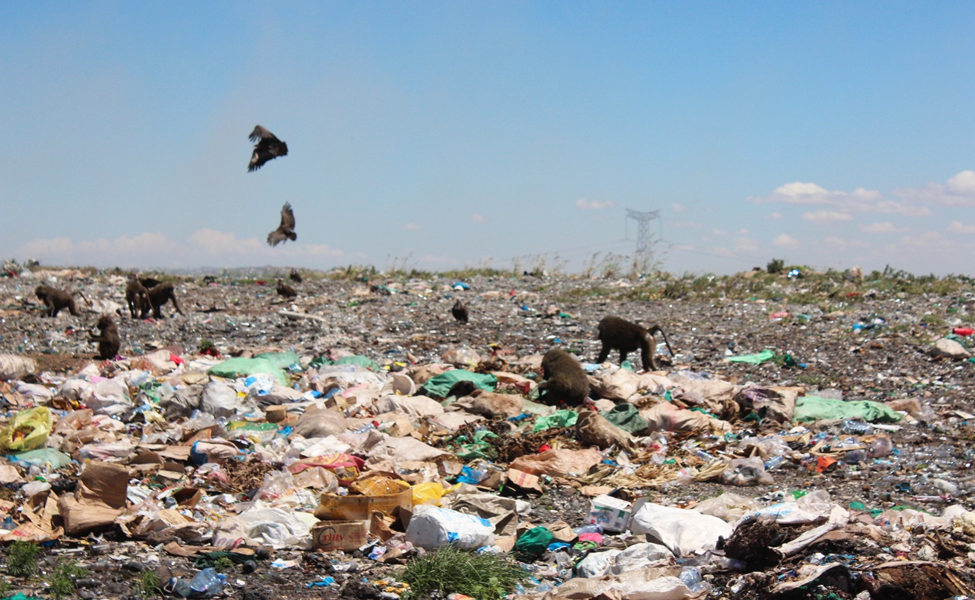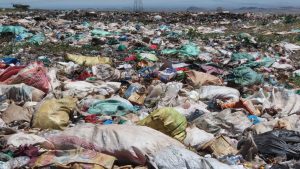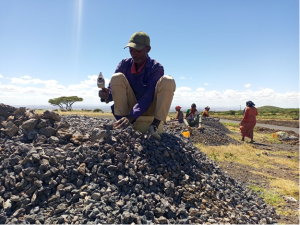DORIA YAIMARISHWA KATIKA MGODI WA DABEL HUKU BUNDUKI MOJA YA POLISI ILIYOIBIWA IKIPATIKANA.
July 25, 2024


By Machuki Dennson
Approximately 15 kilometers from Marsabit town, Marsabit County, is Dadach boche, an open, illegal dumpsite that serves the town of Marsabit and its environs.
A walk down the town during the day, around midday, on the Marsabit North Horr road, you are most likely to be welcomed by a cloud of smoke billowing from the dumping site.
Waste collectors here set a heap of garbage on fire, releasing toxic fumes into the air.
On my stroll there from a distance I could still see shimmering plastic bags and glass bottles, glistening under the scorching sun.
At this dump site illegal plastic bags, plastic bottles, broken glass bottles of medicine and alcohol, and baby diapers are all sprawling here. There is biodegradable waste like rotten mangoes, human waste, food remains, kitchen waste, and market waste all found their way there. The litter is scattered all over the area about half an acre of land. This is a clear indication that Marsabit contributes actively to plastic waste generation into the environment despite the plastic ban in Kenya in 2018.

It had been set on fire by three young men, waste pickers who were searching for scrap metals. Sometimes the company that cleans the town of Marsabit, Marsabit Safi Services, also sets the waste on fire oblivious to the fact that it is an illegal practice and bad for the environment because among other reasons, doing so releases some toxic chemicals into the air and we all inhale.
This is an open space and so the wind is so strong blowing away the plastic bags, other waste, and the toxic smoke into the sky. People are in the area as far as Shegel, unknowingly inhaling the smoke while animals pick the plastic bags while grazing.
It is difficult to maneuver the place as it is littered with broken pieces and shards of glass. There is the imminent danger of stepping on a needled syringe dumped in the place. Scavengers and monkeys scavenge the dumpsite for what they can grab for the day.

Plastic is cheap and incredibly versatile with properties that make it ideal for many applications.
All the women selling khat, (miraa), package the miraa in the banned black plastic bag in Marsabit town and buyers go with those bags wherever they will settle to chew and leave the bags flying into space once they are done. The plastic bags are smuggled from Ethiopia into Kenya.
Transparent flat plastic bags are common for packaging all groceries, milk, cooking oil, paraffin, and anything that one wants and has no way of carrying. Everyone who buys kale or cabbages every day carries them using a flat plastic bag.
Most soft drinks come in plastic bottles and unfortunately, almost all of them are for single use. Very few people reuse them and no one gives a damn about recycling.
At the open dumpsite, a black plastic carrier bag from the hospital with syringes, medicines, cotton, and other wastes has been disposed of. The bag has been drawn aside probably by a wild animal licking the leftover blood.

It is estimated that the world is producing over 380 million tons of plastic every year, with some reports indicating that up to 50% of that is for single-use purposes.
The worrying statistics show that humans eat up to 18 kilograms of plastic in their lifetime.
This over-reliance on plastic products is posing severe environmental, social, economic, and health consequences.
Two kilometers away from the dump site is Mr. Golompo Duba, a father of seven and one wife. He is crushing stones by the roadside for gravel together with his wife, son, and in-law.
He is spiritually crushed and looks with dashed hopes. He has been crushing stones since April 2023. He told me he opted to do that work after he lost all his animals to the devastating drought that hit the country. Golompo had 150 goats but now he has none.

All his goats died due to the biting hunger. They lost value as they were extremely emaciated. At first, they sold them at kshs 3, 000 then dropped to kshs 1500 then kshs 500, then kshs 1000, and finally kshs 200. Still, they did not get as many buyers, so he and other pastoralists lost a lot.
Golompo said he slaughtered a few goats for his family and in the rumen there were plastic bags. The goats had eaten even plastic bags while grazing in the fields.
Some animals fell victim to bloating and digestive issues caused by ingesting plastic bags and other plastic waste, such as nylon and beauty salon hair.
This plastic pollution significantly diminished the health and value of the livestock, affecting milk and beef production
According to a research finding on the prevalence of plastic bags in slaughtered livestock rumens, the ingested plastic bags have implications on the livestock industry with many affected livestock presenting generally weak conditions, suffering boat and depression which affect milk and beef production.
This could have eaten up Golompo’s goats and other pastoralists’ source of livelihood.
How is the government going to beat this?
The National Environmental Authority, NEMA, Marsabit County Director Mr. Naftali Osoro only hopes that people will embrace behavioural change. He said the NEMA understaffing poses a severe challenge to the enforcement of the existing environmental regulations or waste management practices. They are only two staffs in Marsabit County, the largest in the country covering 77km 2. The county government of Marsabit has for more than five years been in the process of drafting a waste management policy. The Chief Officer in the Department of Environment and climate change Abdullahi Ismail said it is not clear as of now what the stage of the draft is, however, he alluded that once it is ready it will help control environmental pollution.
Ismail believes the concerted efforts between NEMA and his officers in the Department of Environment will eradicate the plastic menace in Marsabit town.
He said NEMA effected the ban years back in Marsabit town and it was successful. People were arrested and charged. However, he said it is not easy to effect the ban in Moyale because the border town is too porous.
“Clearly, this is the baby of municipalities, the cleaning of the town and site disposal management, ours is to give technical advice and recommendations, “said Ismail when asked about the issue of the dadach boche dump site.
He however said he is going to send his technical environmental officers to conduct town inspection and site inspection and from there give recommendations to both the Marsabit town municipality and the Department of the Environment. The team will give an assessment report and advice on the look of the town and the roadmap to the appropriate way they should work out.
The regulation and enforcement gap and ignorance of the existing NEMA laws leave residents of Marsabit to decide how to dispose of their waste.
As of 2018, waste generation was low in Kenya as may be compared to the world average.
The 2018 figures show that per capita waste was 11 kilograms per year compared to the world average per capita waste generation rate of 29 kilograms per year.
Evidence as per the Laurent Lebretonand Anthony Andrady shows that of lack of collection services in rural areas in Kenya leads to leakage into terrestrial and marine ecosystems. An estimated 37 thousand tons of plastic leak into the ocean every year and 67 percent of that leakage comes from urban centers. The problem is projected to get worse by 2060, plastic generation will be 1.9 million metric tons per year.
The sectors that produce the most plastic waste in the country are packaging, textiles, and automotive tires.
NEMA says through an Act of Parliament of Solid waste management Act 2022, the government has embraced the circular model system of solid waste management. This system promotes the reusing and recycling of material to minimize waste.
Banning single-use plastics as was done by Kenya in 2017 and advocating for reusable alternative packaging materials also goes a long way in addressing plastic waste menace.
However, the ban is seemingly not being effected in Marsabit County. The battle against plastic pollution remains an uphill struggle, with environmental regulations openly flouted, the landfill situation unresolved, and the need for widespread awareness and behavior change.
Plastic waste should be reduced through policy interventions, change of behavior and consumption patterns, and exploring more environmentally friendly alternatives to plastics.
To beat plastic pollution, it is an opportune time to develop and implement mechanisms geared toward regulating the production, consumption, and disposal of plastic materials for environmental conservation. This may require the use of marshals (kanjos) to enforce the regulations before people embrace environmental conservation and behavioral change.
The Catholic Church around the world has been consistent over the years in calling for environmental conservation terming it as our common home.
Pope Francis’s encyclical on ecology, Laudato Si, says that climate change is real and mainly “a result of human activity.”
During a Television interview in 2022, Pope Francis said it is criminal to throw plastic into the sea; “Throwing away plastic in the sea is criminal. This kills biodiversity, the earth, and everything,” Pope Francis said.